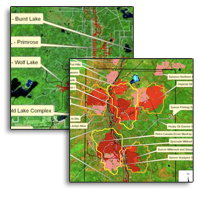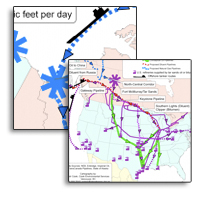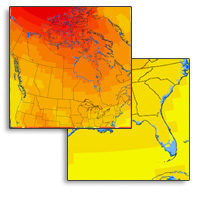Tar Sands 101
The Tar Sands "Gigaproject" is the largest industrial project in human history and likely also the most destructive. The tar sands mining procedure releases at least three times the CO2 emissions as regular oil production and is slated to become the single largest industrial contributor in North America to Climate Change.
The tar sands are already slated to be the cause of up to the second fastest rate of deforestation on the planet behind the Amazon Rainforest Basin. Currently approved projects will see 3 million barrels of tar sands mock crude produced daily by 2018; for each barrel of oil up to as high as five barrels of water are used.
Human health in many communities has seriously taken a turn for the worse with many causes alleged to be from tar sands production. Tar sands production has led to many serious social issues throughout Alberta, from housing crises to the vast expansion of temporary foreign worker programs that racialize and exploit so-called non-citizens. Infrastructure from pipelines to refineries to super tanker oil traffic on the seas crosses the continent in all directions to allthree major oceans and the Gulf of Mexico.
The mock oil produced primarily is consumed in the United States and helps to subsidize continued wars of aggression against other oil producing nations such as Iraq, Venezuela and Iran.
To understand the tar sands in more depth, continue to our Tar Sands 101 reading list
What Happened on the BP Oil Rig?
What Happened on the BP Oil Rig?
The facts, now out, are detailed here. The moral reckoning has yet to begin.
By Rex Weyler, TheTyee.ca
June 18 2010
Red flags were ignored.
After the Deepwater well blew out, the first announcement from British Petroleum (BP) assured the public that "we have the best engineers in the world." Then they announced that the damaged well flowed at a rate of "one thousand barrels per day" (b/d).
Estimates now range between 50 and 150 b/d.
How do the "best engineers in the world" get this wrong by two orders of magnitude?
Fort McMurray MP urges Stelmach to safeguard Clearwater river from tar sands [!!]
Alberta MP urges Stelmach to safeguard river from oilsands plan
By Trish Audette and Mariam Ibrahim,
Edmonton Journal
June 17, 2010
EDMONTON — A Fort McMurray Conservative MP wants Premier Ed Stelmach to protect a northern Alberta river and send a "clear signal" to the oil industry about safekeeping freshwater sources.
In a two-page letter sent last month, Fort McMurray-Athabasca MP Brian Jean took aim at Nexen Inc.'s plans for the Long Lake oilsands project, which include tapping into the Clearwater River.
BP Gulf Oil Spill No Barrier to $3.8 Billion [Whiting] Refinery Expansion
BP Gulf Oil Spill No Barrier to $3.8 Billion Refinery Expansion
June 02, 2010
More From Businessweek
By Joe Carroll
June 2 (Bloomberg) -- BP Plc’s $3.8 billion expansion of the largest refinery in the U.S. Midwest won’t be delayed by criminal and regulatory probes into the company’s role in the largest oil spill in the country’s history.
Sierra Club Chooses Corporate Sponsorship Over Grassroots Activists
Sierra Club Chooses Corporate Sponsorship Over Grassroots Activists
June 16, 2010
There is no shortage of worthy targets in the gulf cleanup effort that the
Sierra Club could be aiming for right now: the Center for Biological
Diversity exposed
Ken Salazar for granting new drilling permits after
he said there was a moratorium. Food & Water Watch filed
Cuba gets ready for BP oil spill
Cuba gets ready for BP oil spill
Cuba is making preparations to protect its coast as the BP oil spill continues spreading through the Gulf of Mexico, Cuban officials said today.
News wires 15 June 2010
They offered few specifics about the preparations, but said Venezuela, Cuba's oil-rich ally, has sent a team of spill-fighting experts to help the communist-run island.
Millions of gallons of oil have gushed into the gulf in the 57-day-old spill and fouled 120 miles (190 kilometres) of US coastline.
Oil Shale or Shale Oil?
Oil Shale or Shale Oil?
A Case of Mistaken Identity
By Keith Kohl
Thursday, June 17th, 2010
There are few things in life that anger me more than one of my readers being swindled.
And you should be just as irritated, because it's your hard earned money that's at stake.
Now, you know that shale oil isn't new to us. We've been covering the development of shale deposits for years. And my readers and I know how well that's turned out investors.
When the shale rush began, it was impossible to pick a losing play. Of course, things are much different today. But I digress...
Communities for a Better Environment v. City of Richmond: climate change mitigation measures do not stand muster under CEQA
Communities for a Better Environment v. City of Richmond: climate change mitigation measures do not stand muster under CEQA
Alston & Bird LLP
Rebecca Harrington
USA
June 15 2010
Should bigger oil tankers really be in Vancouver?
Should bigger oil tankers really be in Vancouver?
By Peter Baker,
Special to The Province
June 17, 2010
Vancouver has been a major crude-oil export port for many years. Crude-oil exports last year hit four million metric tonnes, or about 29 million barrels, according to Metro Port Vancouver. Plans are now underway to increase those shipments this year.
So why has there been so little public discussion about this development? Is it wise for Vancouver, the economic engine of the entire province, to be a major crude-oil export port?
Premiers (Inc. Campbell) promote pipelines to Pacific
Premiers promote pipelines to Pacific
Tom Fletcher
BC Local News
June 16, 2010
Premiers of western provinces and territories wrapped up two days of
meetings in Vancouver Wednesday, pledging to strengthen their east-west
pipelines, power lines and rail links for trade to Asia.
Premier Gordon Campbell, who chaired the annual conference, said western
provinces produce 91 per cent of Canada's oil, 94 per cent of its natural
gas, 27 per cent of its hydroelectricity and all of its uranium, plus
growing sources of wind, bioenergy and solar power.



